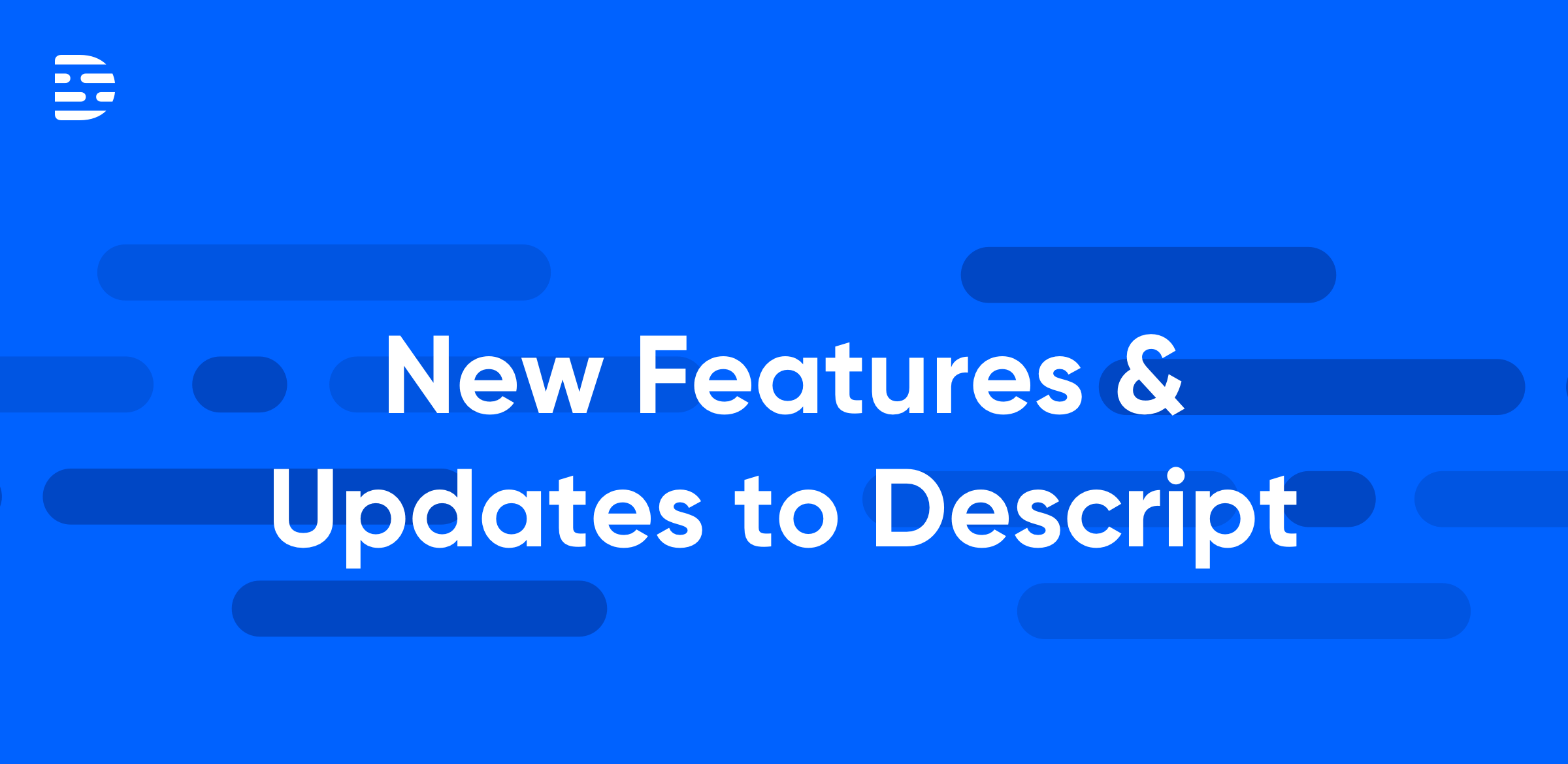The verdict: With a remote recording studio that checks all the boxes and a full-featured editor, Descript has built an all-in-one tool at a price that makes it the no-brainer choice for podcasters.
Remote recording is a staple of any podcaster’s toolkit these days. But which tool should be in your kit?
The two answers you’ll hear most often: Descript and Riverside. Riverside is known for its simplicity and for doing one thing—remote recording—well. It’s recently added some basic editing capabilities and AI features.
Descript is a next generation podcast and video editor that’s become the standard for podcasters—and it recently added remote recording by acquiring and integrating SquadCast, another great remote recording platform. SquadCast was always known for its reliability, but it was more expensive and didn’t have some of Riverside’s basic features. Now that it’s part of Descript, it’s free, and it comes as part of one of the most popular modern podcast editing suites.
So both Riverside and Descript now offer good, reliable remote recording. But the similarities really end there. With Riverside, you’ll need a separate editing tool if you want your podcast to sound even passably good. Descript does it all. It gives you the editing power you need to make a professional-grade podcast, plus it’s as intuitive as editing text, and loaded with AI features that make production go much, much faster than in other tools. Now it’s got remote recording too, so it can literally handle every part of your workflow, from recording to publishing. And even with all that, it’s cheaper than Riverside.
But you should decide for yourself. So in this article, we’ll put Descript and Riverside head-to-head to help you decide which tool works best for you.
Remote recording essentials
First, let’s just talk about the essentials of any remote recording experience: quality, reliability, and the guest experience.
Both Descript and Riverside have you covered here:
- Reliability and quality via local, lossless recording. Even if you or your guests have a glitch in their internet connection, it’s not going to affect the quality of the recordings. Riverside has been getting better and better, and many podcasters report using it without issue. So your recordings should be safe either way.
- Lossless audio and 4k video. Both Descript and Riverside record the highest-quality files.
- Anonymous guest links. With both Descript and Riverside, guests can join recording sessions in a click from their browser—no account setups or apps to download.
- Progressive upload technology. Thanks to SquadCast (now integrated with Descript), you get an extra layer of security with continuous uploads that protect your files if connections drop.
If you’re exploring other recording tools, Zencastr is also well known for local recording and high-quality audio.
Editing your recordings
Unless you and all your guests have the super power of speaking perfectly formed thoughts, in perfect sentences, at all times, and everyone in your podcast records from a professional studio, your next stop after recording will be an editor.
Historically, podcasters have imported their recordings into powerful but unwieldy timeline editors like Pro Tools or Adobe Audition.
In the last few years, a new class of editors has emerged — led by Descript — that use AI to make it possible to edit your video like a doc. It’s easier and faster, yet packs all the power of conventional editors.
This is Descript’s super power, and what makes it hard to beat as an overall solution for podcasters. While Riverside has recently added some text-based editing capabilities, they’re fairly basic compared to Descript, which is a full-featured editing studio with the power to replace a traditional editor.
Just a few of the things you’ll find in Descript:
- A fully powered timeline editor for fine-grained audio editing
- Animation tools for making dynamic video or social-media promos
- A stock media library with millions of music tracks, sound effects, images, and videos
- A library of transitions and audio-video effects
- Customizable templates and re-usable layouts
Having these sorts of tools at your fingertips is critical for creating a podcast that people want to listen to.
Improving sound quality
Getting good sound from your remote recording sessions is one of a podcaster’s biggest problems. Even if you have a super fancy mic, all your guests won’t. You can meticulously set up your recording space for sound quality, but then your guest joins from the airport, and there goes your audio. In desperation, many podcasters will shell out a few hundred dollars for an extra mic they can mail to their guests—but that’s a huge logistical challenge, and it creates a lot of work for your guests.
You’re probably not even thinking a recording tool can help you here, because it’s a mic thing—but with Descript you can instantly fix bad audio in editing, using this game-changing AI effect called Studio Sound.
It’s not just a normal noise reduction thing, it’ll actually take a recording that was made on a laptop mic in someone’s kitchen, and make it sound like it was made with a professional mic in a studio. It basically solves the guest audio-quality problem, and it’s one of the reasons that tons of Riverside customers, even if they’re not doing a lot of editing, were also using Descript even before Descript offered remote recording.
AI features that stand out
Like everyone else, Riverside has added some handy AI tools lately. But Descript has been shipping eye popping AI features for half a decade. Here are a few that will transform your podcast production workflow.
Overdub changes your speech with AI
Descript has an AI voice-cloning tool called Overdub that lets you create new audio just by typing. That means you can fix a mistake—where you mispronounce a name or just say the wrong thing—just by highlighting that part of the audio and typing what you should’ve said. Or add entirely new audio without ever speaking at all. Both of those are infinitely better than re-recording stuff. No other editing tool has this.
Regenerate makes impossible edits possible
There’s also a feature called Regenerate that gives you the power to fix previously un-fixable edits. Like when you cut a section of audio, and the remaining two sections are just completely different in tone—one soft, one animated—or when your voice just lost energy while recording. No audio engineering tool in the world can fix those kinds of problems—but you can, with Descript.
Filler word removal for ums and uhs
Descript’s AI also lets you remove all the “ums,” “uhs,” “likes,” and other filler words in a couple clicks. Again, unless you’re some kind of verbal mastermind, you can see why you’d want that—everybody uses filler words, and editing them out is incredibly time-consuming, and difficult.
Eye contact correction that is surprisingly helpful
Finally, if you’re recording video, Descript has an amazing feature that adjusts your gaze to make it appear you’re looking directly into the camera, even when you’re not. So you can be looking at your guest or cohost on your laptop screen the whole time you’re recording, then click Eye Contact, wait a few minutes, and bam—now it looks like you were looking at the camera. It’s much more engaging for a viewer, and as easy as a click.
Extract highlight clips for social media
Another thing podcasters care a lot about is pulling highlights from their episodes to use as promos for social media. Both Descript and Riverside have tools to help you with this.
Riverside has a clip creation tool called “Magic Clips” that promises to automatically find the best clips and turn them into social promos. In Descript, making social clips is super easy thanks to the AI action, Find Good Clips. Find Good Clips will extract your best highlights, which you can quickly turn into arresting visual clips with Descript’s social-media editing tools. Add captions, change aspect ratio, drop in music or GIFS—and save it as a template. Watch the video to see it in action.
Collaboration features
Descript has Google Docs-style live collaboration, with multiplayer editing, commenting with mentions and notifications—everything you’d expect. You can even invite people who don’t have a Descript account to leave comments.
Riverside doesn’t have that. So if collaboration is an important part of your workflow, Descript is your best option.
Mobile support options
If you’re looking to do remote recording sessions on the go, both Descript and Riverside have mobile offerings. Which is right for you depends on what you’re looking for.
Riverside has a mobile app, which is as easy to use as the web app and lets you take advantage of the high-quality cameras in most smart phones. It’s nice for recording with regular collaborators like cohosts, but a lot of guests will blanche at the idea of downloading an app.
Descript’s mobile recording works directly in a phone’s browser, which is a better guest experience, but lacks some of the creature comforts of a native app.
Pricing comparison
Both tools have free plans that let you try them out and get a taste of their capabilities.
Riverside’s paid plans start at $15; that gets you five hours of audio recording a month. For $24, you get 15 hours, plus free transcription and a few other bells and whistles.
Descript’s paid plans start at $12. For that you get 10 hours of recording—plus all the editing features we’ve covered here. So even if you only used it for remote recording, Descript would cost less than half as much as Riverside. And if you add in all the editing firepower and AI magic, Descript is the more economical choice by an order of magnitude.
Zencastr also offers a free tier and paid plans beginning at $15, which gives you enough monthly recording hours for most casual podcasters. Compare which plan — and platform — best fits your needs before you commit.
There are things to really like about Riverside, but when you consider that their offering is just a relatively small part of the overall Descript suite—at a higher price—it’s hard to justify.
Frequently asked questions
\nCan I record a remote interview in Descript?
\nYes. You can record remote conversations right in Descript using Descript Rooms or by connecting your SquadCast account. Each participant joins through their browser—no extra downloads needed. Once you’re done, your session immediately appears in Descript for editing.
\nDoes Descript record separate tracks for each guest?
\nYes. Descript automatically creates what we call a “sequence,” so each guest’s audio (and video if enabled) is a separate track. This lets you remove background noise or crosstalk from individual tracks without affecting the rest.
\nHow do I reduce background noise in my remote recording?
\nEnable Studio Sound before or after your session. Studio Sound uses AI to remove echoes, hums, and other background noise, so even less-than-ideal recording environments sound more polished.
\nIs there a time limit for remote recordings in Descript?
\nYes. You can record up to 4 hours with the Editor recorder on Windows or macOS. The Quick recorder supports up to 3 hours on Windows and 4 hours on macOS.








































